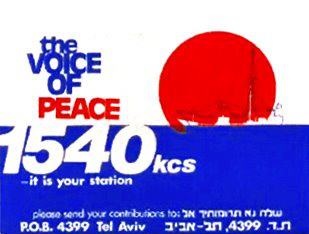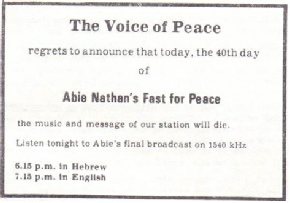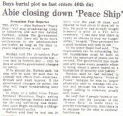© 2014-


Voice of Peace - History (5)
On 12th August 1977 the Voice of Peace started test broadcasts in the shortwave band and these continued throughout September and October, with reception reports being received from many countries particularly in western Europe. In late 1977 the Voice of Peace's London representatives, Broadcast Placement Services, (BPS) ceased operations. The loss of this organisation impacted heavily on the Voice of Peace’s operation because BPS had been heavily involved in the recruitment of English speaking broadcasting and engineering staff as well as the successful sale of commercial airtime to non-
At about the same time Abie Nathan decided to dispense with the services of the Tel Aviv advertising agency which sold airtime on the Voice of Peace to Israeli-
1978
This unsettled situation continued throughout the remainder of 1977 and into early 1978, then on 17th February 1978 the Jerusalem Post announced that the station may have to close at the end of the month because money was running out. Abie Nathan was quoted as saying that the Israeli state network (which was offering discounted rates to advertisers who did not use the Voice of Peace) and "hostile advertising agents" had all but squeezed his station out of the commercial market. In addition storm damage to the ship and its broadcasting equipment had cost nearly half a million Israeli pounds to repair.
Amongst advertisers who had withdrawn support from the station at this time was Coca Cola and Abie Nathan promised to start a retaliatory advertising campaign on the Voice of Peace urging listeners to drink water. For some time after this the station did in fact carry promotions pointing out the benefits of water as a healthy and refreshing drink.
Later in the article Abie Nathan stated that despite the Broadcast survey of August 1977, which showed the station having an audience of 23 million listeners in the Middle East, some of the big advertising agencies had spread rumours that the station had hardly any audience. Abie Nathan threatened in the Jerusalem Post article that "unless there are some new developments the Voice of Peace will go silent eleven days from today."
As no new developments did take place Abie Nathan began to announce o n air that the station would have to close on 28th February 1978. He asked listeners to join him in Tel Aviv for a farewell rally on 25th February and over 60,000 people turned up. This event received widespread publicity in Israel and went some way to convincing advertisers that the station did have a large listenership after all. On the day before the planned closure Abie Nathan decided that because so many companies -
n air that the station would have to close on 28th February 1978. He asked listeners to join him in Tel Aviv for a farewell rally on 25th February and over 60,000 people turned up. This event received widespread publicity in Israel and went some way to convincing advertisers that the station did have a large listenership after all. On the day before the planned closure Abie Nathan decided that because so many companies -
By a fortunate coincidence (for Abie Nathan) the Israeli state network, Kol Israel, was forced off the air by a strike at the beginning of April 1978, a few weeks after the threatened closure of the Voice of Peace. Advertisers, now aware of the Voice of Peace's likely audience size following the rally in Tel Aviv, flocked to the offshore station and many entered into long term commercial contracts which continued after the state network strike had ended.
During the strike, which lasted twelve days, only the Voice of Peace and the Army station, Galei Zahal continued broadcasting. The Voice of Peace benefited from increased advertising revenue because the Army station carried no commercials, but the military station did attract a larger audience at many times of the day. It did so because it still provided a news service -
A public opinion survey published at the beginning of May 1978 showed listenership patterns in Israel at the end of April and indicated that 24% of 18-
On 16th May 1978 Abie Nathan started a fast for peace. He said that he would not eat and was prepared to fast until death on a diet of prune juice and water until Israeli Prime Minister Menachen Begin made some move towards creating a peace settlement. He also announced that the Voice of Peace would close on 24th June 1978 -
The Israeli Government did nothing towards meeting Abie Nathan's peace objectives so at 6.30pm on 24th June 1978, he closed the Voice of Peace and the MV Peace sailed into Ashdod. During the journey a continuous tape was played saying simply "We say give peace a chance".
did nothing towards meeting Abie Nathan's peace objectives so at 6.30pm on 24th June 1978, he closed the Voice of Peace and the MV Peace sailed into Ashdod. During the journey a continuous tape was played saying simply "We say give peace a chance".
A few days later, on 28th June 1978 Abie Nathan, thin, weak and in a wheelchair, visited the Israeli Parliament, the Knesset, and spoke with Government ministers. He later announced that in response to an unprecedented appeal from all 120 members of the Knesset he had decided to end his hunger strike.
Following this decision the Voice of Peace returned to the air on 30th June 1978, although little if anything appeared to have been achieved by the whole incident, except that the Roll Royce generator, which had been ashore for four months for repair, had been reinstalled on the MV Peace during its stay in Ashdod.
Early in July 1978 the Voice of Peace broadcast an hourly appeal for the "Children of Lebanon Appeal" which Abie Nathan had set up to provide medicines, toys and an ambulance for children suffering in the war-
The MV Peace raised her anchor on 7th August 1978 an hour after transmissions of the Voice of Peace had closed and sailed towards the Israeli port of Ashdod where the supplies were loaded on board. Early the following day the radio ship left port heading towards Beirut with a team of DJs and an Israeli Television crew on board. Transmissions from The Voice of Peace resumed once the ship was clear of the port area (although still inside Israeli territorial waters) and continued throughout the day as the MV Peace sailed up the Israeli coast. At midnight on 8th August 1978 normal programmes were changed to tapes of Arabic music, with station identification announcements and messages to the people of Lebanon saying they had essential supplies on board and wanted to deliver them to Beirut.


Click on picture to enlarge
History
Key Dates
Ship and Location
Technical
Staff
Programmes






Treasure Chest


Jerusalem Post
23rd June 1978

Back to Voice of Peace

Back to Israel Gallery

